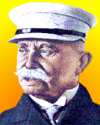
In 1908, Count Ferdinand von Zeppelin boarded his fourth new airship, at Friedrichshafen, Germany, and took it out on a short first flight. The Luftschiff LZ4 had its first extended flight (12 hours) traveling to Switzerland on 1 Jul 1908. At the beginning of August, it embarked on an extended flight which included Basel, Straussberg, and many of the major cities of southern Germany. While moored at Echterdingen on 5 Aug 1908, it was torn from the mast by high winds and destroyed by fire. He was nearly bankrupted. But, as interest in the Zeppelins was running high in Germany, the incident was felt as a national disaster. Spontaneous donations resulted in approximately 5.5 million Marks and made it possible for Zeppelin to continue his work.
It had been eight years since the first ascension of a Zeppelin airship, which rose from its Lake Constance floating hangar on 2 Jul 1900. You can read about “The First Two Trial Trips of Von Zeppelin’s Airship” in this illustrated article from Scientific American Supplement (1900).

On 20 Jun 2003, I. Bernard Cohen died, who was the first American to receive a Ph.D. in history of science. The subjects of his books have included those with a specific focus, such as Benjamin Franklin and an Introduction to Newton’s “Principia”, which are informative, engaging and readable. But he also wrote titles with a broad sweep through history. Today's book pick is: The Triumph of Numbers: How Counting Shaped Modern Life, by I. Bernard Cohen, in which he brings together the pyramids to mortality tables, Galileo to Florence Nightingale, in a vibrant history of numbers and the birth of statistics.
Cohen explores how numbers have come to assume a leading role in science, in the operations and structure of government, in marketing, and in many other aspects of daily life. Consulting and collecting numbers has been a feature of human affairs since antiquity―taxes, head counts for military service―but not until the Scientific Revolution in the twelfth century did social numbers such as births, deaths, and marriages begin to be analyzed. Cohen shines a new light on familiar figures such as Thomas Jefferson, Benjamin Franklin, and Charles Dickens; and he reveals Florence Nightingale to be a passionate statistician. Cohen has left us with an engaging and accessible history of numbers, an appreciation of the essential nature of statistics.
It is available from Amazon, typically about New from $8.95. Used from $2.67. (As of earlier time of writing - subject to change.)
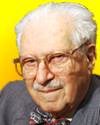 | History without the history of science, to alter slightly an apothegm of Lord Bacon, resembles a statue of Polyphemus without his eye—that very feature being left out which most marks the spirit and life of the person. My own thesis is complementary: science taught ... without a sense of history is robbed of those very qualities that make it worth teaching to the student of the humanities and the social sciences. |
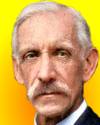 | It is an old saying, abundantly justified, that where sciences meet there growth occurs. It is true moreover to say that in scientific borderlands not only are facts gathered that [are] often new in kind, but it is in these regions that wholly new concepts arise. It is my own faith that just as the older biology from its faithful studies of external forms provided a new concept in the doctrine of evolution, so the new biology is yet fated to furnish entirely new fundamental concepts of science, at which physics and chemistry when concerned with the non-living alone could never arrive. |
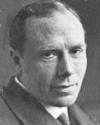 | Increased knowledge of heredity means increased power of control over the living thing, and as we come to understand more and more the architecture of the plant or animal we realize what can and what cannot be done towards modification or improvement. |
| Before you look at today's web page, see if you can answer some of these questions about the events that happened on this day. Some of the names are very familiar. Others will likely stump you. Tickle your curiosity with these questions, then check your answers on today's web page. | |
| Births | |
 | Reginald Crundall Punnett, born 20 Jun 1875, was an English Mendelian geneticist who, with the English biologist William Bateson, were among the first English geneticists. They reported the discovery of two new genetic principles: the first account of genetic linkage in sweet pea; and gene interaction (1905). Punnett devised the “Punnett” square. What is the purpose of the Punnett square? |
 | Sir Frederick Gowland Hopkins, born on 20 Jun 1861, was a British biochemist, who shared the 1929 Nobel Prize for Physiology or Medicine for discovery of essential nutrient factors, needed in animal diets to maintain health. Hopkins fed young rats on a basic diet which, in addition to the necessary salts, contained a carefully purified mixture of lard, starch, and casein (the most abundant protein in milk). After some time the animals ceased to grow. Then Hopkins demonstrated that it was only necessary to add a very small daily amount of milk, 2 - 3 cc for each animal, for growth to recommence. By what name are the essential nutrient factors now known? |
| Deaths | |
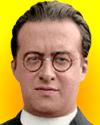 | A Belgian astronomer and cosmologist (1894-1966) formulated the modern big-bang theory, which holds that the universe began in a cataclysmic explosion of a small, primeval “super-atom.” Can you name this man? |
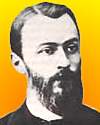 | Dmitry Iosifovich Ivanovsky (1864-1920) was a Russian microbiologist who, from his study of mosaic disease in tobacco, first reported the characteristics of a new life form. (They were also independently discovered and named by the Dutch botanist M.W. Beijerinck only a few years later.) Ivanovsky had been commissioned in 1890 to study a mysterious disease that was killing tobacco crops in the Crimea. He determined that some agent in sap could transfer disease from plant to plant. Through detailed filtering and microscope work, he concluded that some invisible parasite, much smaller than any known bacterium, was the culprit. What is the name of this new life form? |
| Events | |
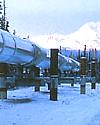 | On 20 Jun 1977, the $7.7 billion Trans-Alaskan oil pipeline opened linking oil fields in Prudhoe Bay to an ice-free deepwater shipping port, where the oil arrived 38 days later. Because of the earth’s heat at greater depths, oil pumped from the Prudhoe Bay field is put through heat exchangers that work like a car’s radiator to cool the oil before it enters the pipeline. At what shipping port does the pipeline end? |
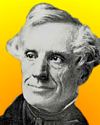 | On 20 Jun of a certain year, Samuel F.B. Morse received a U.S. patent for telegraphy signals. In what decade was this patent issued? |
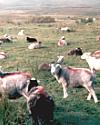 | On 20 Jun 1986, the slaughter and movement of lambs in parts of Cumbria, Scotland, was temporarily banned, to protect public health. What was the cause for this restriction? |
Fast answers for the previous newsletter for June 19: Bohr • pressure • Royal Society • circumference of the Earth • Louisiana • features of the solar surface, solar prominences or sun spots.
 If you enjoy this newsletter, the website, or wish to offer encouragement or ideas, please send feedback by using your mail reader Reply button.
If you enjoy this newsletter, the website, or wish to offer encouragement or ideas, please send feedback by using your mail reader Reply button. Your click on a Facebook, StumbleUpon, or other social button on the site webpages is also a welcome sign of appreciation. Thank you for using them.
© This newsletter is copyright 2020 by todayinsci.com. Please respect the Webmaster's wishes and do not put copies online of the Newsletter — or any Today in Science History webpage. (If you already have done so, please remove them. Thank you.) Offline use in education is encouraged such as a printout on a bulletin board, or projected for classroom viewing. Online, descriptive links to our pages are welcomed, as these will provide a reader with the most recent revisions, additions and/or corrections of a webpage. For any other copyright questions, please contact the Webmaster by using your mail reader Reply button.
--
If you do not want to receive any more newsletters, Unsubscribe
To update your preferences and to unsubscribe visit this link
Executive Real Estate Business Class
-
"It was like a man with wings. It wasn't like anything you'd see on TV or in a monster movie." ...
About the publisher
Search This Blog
Blog Archive
-
▼
2020
(1542)
-
▼
June
(193)
- TRAVEL: Epic America—Our photographers' picks
- On This Day for June 30 - Night of the Long Knives...
- Newsletter for Tuesday 30 June.
- We told you: Mass-Tracking COVI-PASS Immunity Pass...
- June 30: Theory of Evolution, the Night of Long Kn...
- HISTORY: And the symbols come tumbling down
- Explore the Ocean with Nat Geo Kids Magazine
- New This Week on History News Network
- On This Day for June 29 - London's Globe Theatre d...
- Newsletter for Monday 29 June.
- COVID Cartoon Night (not funny) while we weep for ...
- June 29: Shakespeare's Globe Theatre Burns Down an...
- FAMILY: Getting your kid to help others
- Henry VIII's surprising burial place | The world's...
- On This Day for June 28 - Assassination of Archduk...
- Say the wrong thing: lose visitation with your kid...
- Newsletter for Sunday 28 June.
- June 28: Franz Ferdinand Assassinated, the Treaty ...
- The Compass: Kenya
- How the Invention of A/C Changed US Politics
- On This Day for June 27 - Yen made official moneta...
- Newsletter for Saturday 27 June.
- June 27: 1st Women's Magazine, Nuclear Power Stati...
- CORONAVIRUS SPECIAL EDITION: The virus hasn't won ...
- PHOTOGRAPHY: A legendary photographer's enduring r...
- Partner: How to keep your kids learning vocab this...
- Archaeologists Say They've Just Solved The 400-Yea...
- The Roundup Top Ten From History News Network
- On This Day for June 26 - Opening of CN Tower, Bab...
- Newsletter for Friday 26 June.
- Contact Tracer warns of forced vaccinations plus R...
- June 26: Reconnaissance balloons, Kennedy's Clario...
- YOUR WEEKLY ESCAPE: A dangerous quest for hallucin...
- That Was No Bunny: Watch New Episode of Alone Tonight
- ANIMALS: Leave that elephant alone
- On This Day for June 25 - Korean War begun, Antoni...
- Newsletter for Thursday 25 June.
- June 25: 1st Female PhD, Custer's Last Stand, the ...
- SCIENCE: The heat wave in the Arctic
- Demystified: What Does "SPF" Mean?
- On This Day for June 24 - Russia invaded by Napole...
- Breaking News from History News Network
- Newsletter for Wednesday 24 June.
- June 24: Fatal Medieval Dance Manias, the Gadsden ...
- TRAVEL: Fear of flying and hotel rooms fuels RV boom
- Be at the Front Lines of History's Most Epic Battl...
- On This Day for June 23 - Battle of Bannockburn, C...
- Lowest US coronavirus deaths reported since March ...
- Newsletter for Tuesday 23 June.
- June 23: World's Oldest Parliament, the Contracept...
- Life Under The Shah: What Iran Looked Like Before ...
- HISTORY: A swift goodbye to some racist imagery (a...
- A whole year of Britannica Premium for $49.99?
- New This Week on History News Network
- On This Day for June 22 - Mutiny against Henry Hud...
- Newsletter for Monday 22 June.
- Clintons and Gates Connected at the Hip plus Cardi...
- June 22: Galileo Galilei Recants, Last Shot of the...
- FAMILY: How to keep kids safe as places reopen
- On This Day for June 21 - Japanese defenses destro...
- Newsletter for Sunday 21 June.
- June 21: 1st Governor General of India, Fermat's L...
- The Compass: Ecuador
- On This Day for June 20 - Casket Letters found, Ho...
- Newsletter for Saturday 20 June.
- CORONAVIRUS SPECIAL EDITION: Could public bathroom...
- Mandatory Vaccines coming: Bill Gates Accuses Tho...
- June 20: Attila the Hun, the University of Oxford ...
- PHOTOGRAPHY: Fatherhood 2020 — ‘Fear and courage a...
- Why is America haunted by its past?
- The Woman Who Claimed Emmett Till Wolf-Whistled At...
- This Week's Roundup Top Ten from History News Network
- Exclusive HistoryExtra podcasts | Listen now
- On This Day for June 19 - Rosenbergs executed for ...
- Newsletter for Friday 19 June.
- World Economic Forum starts The Great Reset initia...
- YOUR WEEKLY ESCAPE: How the ultimate shark photo w...
- June 19: London's Metropolitan Police and the 1st ...
- Predator Encounters. Watch New Episode of Alone To...
- ANIMALS: Finding the snow leopards
- Count on a Source You Can Trust
- On This Day for June 18 - War of 1812 begun, Sir P...
- Newsletter for Thursday 18 June.
- Lockdowns, tracing, testing, vaccinating, and Libe...
- June 18: US-British War of 1812, the Battle of Wat...
- SCIENCE: They grew fearsome. They began soft, and ...
- Demystified: How Are Sports Chosen for the Olympics?
- Breaking News from History News Network
- On This Day for June 17 - Arrest of O.J. Simpson, ...
- Newsletter for Wednesday 17 June.
- June 17: Mumtaz Mahal, the French Revolution and G...
- TRAVEL: They hurtled the world's highest point
- Explore together with Nat Geo Kids magazine
- On This Day for June 16 - First woman in space, Jo...
- Newsletter for Tuesday 16 June.
- June 16: Salvation Army Forms, Bloomsday and FDR's...
- HISTORY: Why we can’t shake COVID-19
- New This Week on History News Network
- On This Day for June 15 - Magna Carta sealed by Ki...
- Yes, they really are forcing changes to your world...
-
▼
June
(193)
-
Blogroll
-
About
HistoryFact










0 comments:
Post a Comment